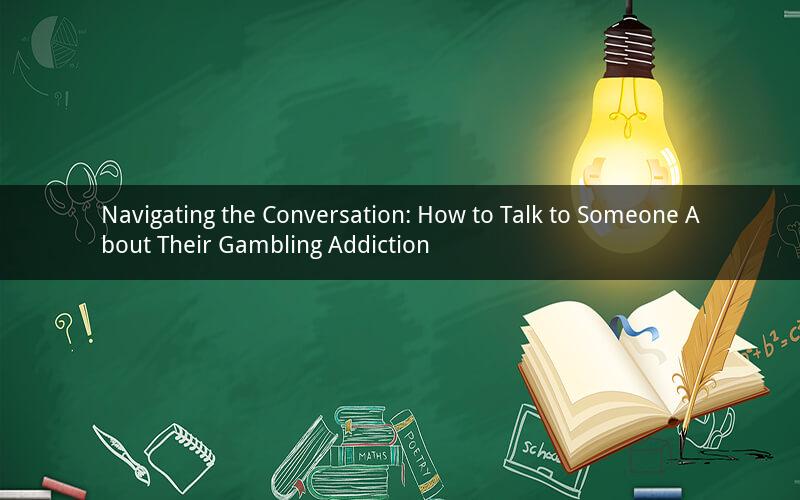
Introduction:
Gambling addiction is a serious issue that affects individuals, families, and communities. It is crucial to approach the topic of gambling addiction with sensitivity and understanding. This article provides guidance on how to talk to someone about their gambling addiction, emphasizing empathy, open communication, and support.
I. Understanding the Problem
1. What is gambling addiction?
Gambling addiction, also known as problem gambling or compulsive gambling, is a behavioral addiction characterized by an inability to control or stop gambling despite negative consequences. It is a complex condition influenced by psychological, social, and environmental factors.
2. The signs and symptoms of gambling addiction
Recognizing the signs and symptoms of gambling addiction is essential in identifying the problem. These may include increased time spent on gambling activities, financial difficulties, neglecting responsibilities, lying about gambling, and experiencing intense cravings or withdrawal symptoms when not gambling.
II. Preparing for the Conversation
1. Choose the right time and place
Select a private and comfortable setting where both parties can feel at ease. It is important to have a calm and non-confrontational environment to facilitate open communication.
2. Reflect on your own feelings and motivations
Before initiating the conversation, take some time to reflect on your own feelings and motivations. Understanding your own emotions will help you approach the topic with empathy and support.
III. Navigating the Conversation
1. Use "I" statements
Express your concerns using "I" statements to avoid sounding accusatory or confrontational. For example, instead of saying "You always gamble and it's driving me crazy," say "I feel worried when I see you spending so much time gambling."
2. Show empathy and understanding
Acknowledge the individual's struggles and emotions. Let them know that you care about their well-being and are there to support them. Avoid judgment or criticism, as this may discourage them from seeking help.
3. Encourage them to share their feelings
Give them the space to express their thoughts and emotions. Listen actively, without interrupting or minimizing their experiences. This will help build trust and create a safe space for open communication.
4. Discuss the consequences of gambling addiction
Highlight the negative consequences of gambling addiction, such as financial, emotional, and social problems. This may include lost relationships, financial difficulties, and legal issues. Emphasize that these consequences are not only affecting them but also those around them.
5. Offer support and resources
Provide information about available support and resources, such as counseling services, support groups, and treatment programs. Encourage them to seek professional help and offer to accompany them if they are willing.
IV. Maintaining the Relationship
1. Be patient and understanding
Recovery from gambling addiction is a gradual process. Be patient and understanding throughout their journey, as setbacks may occur. Continue to offer support and encouragement.
2. Set boundaries and communicate expectations
Establish clear boundaries and communicate your expectations regarding gambling behavior. This may include setting limits on gambling activities or supporting them in seeking professional help.
3. Celebrate progress and milestones
Acknowledge and celebrate their progress and milestones in recovery. This will help reinforce positive behavior and encourage them to continue their journey.
V. Frequently Asked Questions
1. How do I know if someone has a gambling addiction?
Look for signs and symptoms such as increased time spent on gambling activities, financial difficulties, neglecting responsibilities, lying about gambling, and experiencing intense cravings or withdrawal symptoms when not gambling.
2. Can I force someone to seek help for their gambling addiction?
While you can encourage and support them in seeking help, you cannot force someone to change their behavior. It is important to express your concerns and offer support, but ultimately, the decision to seek help lies with the individual.
3. How can I support someone with a gambling addiction?
You can support someone with a gambling addiction by showing empathy, listening actively, offering resources and information about support services, and being patient and understanding throughout their recovery journey.
4. What if the person I'm concerned about refuses to seek help?
If the person you're concerned about refuses to seek help, it is important to continue expressing your concerns and offering support. Consider seeking guidance from a professional counselor or therapist who can provide additional strategies for dealing with this situation.
5. How can I help my loved one stay motivated during their recovery journey?
To help your loved one stay motivated during their recovery journey, continue to offer support, celebrate their progress, and remind them of the positive changes they are making. Encourage them to join support groups or find a mentor who can provide guidance and encouragement.